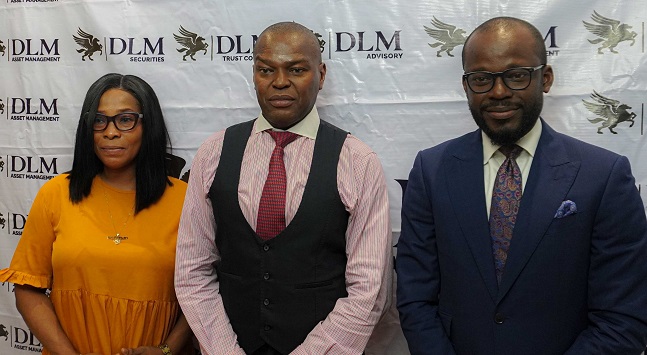E-Financial
What Next for Nigeria as Recession Stages a Comeback?

By Lukman Otunuga, Senior Research Analyst at FXTM
If the Nigerian economy needs more proof that it is wise to diversify away from a heavy dependence on the Oil industry, the latest recession and threat to government revenues ought to do the job.
The country’s ongoing battle to reach healthy growth is under threat thanks to an unprecedented Oil price crash triggered by the coronavirus pandemic back in March 2020. Africa’s largest economy has sunk into its second recession within five years, shrinking by 3.6 percent in the third quarter versus a 6.1 percent contraction in the second quarter. Oil production fell to 1.67 million barrels per day (bpd) from 1.81 million bpd in the previous quarter. The ominous signs are reminiscent of the third quarter of 2016 when the economy contracted for over a year.
The biggest vulnerability is the outsized contribution that the Oil industry makes to the state coffers. In times of strong Oil prices, the industry accounts for around 90 percent of foreign exchange earnings and a handsome 50 percent of government revenues. The plunge in oil prices – which reached sub-zero levels in the wake of the pandemic – dragged on the economy’s recovery from the contraction in 2016.
Government coffers face the prospect of cash flow drying up and the accompanying, unwelcome consequences. These include the prospect of austerity measures, job and salary cuts in the state sector, a reduction in development projects and social protection subsidies along with a heavier reliance on bail-out funds from the IMF and other international lenders.
The IMF projects a 4.3 percent contraction in Nigeria’s GDP this year, the biggest drop in nearly four decades. For the man on the street, this means the threat of unemployment, inflation and soaring food prices. Already, more than half of Nigerians are unemployed in this dire economic scenario. On top of that, a Dollar shortage negatively impacts the private sector’s imports of raw materials and equipment.
Additional vulnerabilities are apparent in the banking sector, which had a N19.54 trillion credit exposure to the weakened real economy in the third quarter, up by N290.13 billion in comparison to the end of August. When added to the state sector’s woes, the results are the triple threats of sovereign debt defaults, bank credit defaults and the state’s reduced capacity to bail out the banking sector.
There’s a chance it’s not too late to avert the worst consequences. On the brighter side, earlier this year, the Central Bank of Nigeria (CBN) took some necessary steps to unify its exchange rates and devalued the Naira by 20 percent, satisfying the World Bank and IMF and opening the door to credit lifelines from international lenders.
Equally important, several international pharmaceutical companies are poised to release their COVID-19 vaccines as early as the end of 2020. While it will take several more months for the vaccinations to progress and short-term uncertainty is expected to prevail, the light at the end of the pandemic tunnel has finally appeared.
Nigeria’s first quarter 2021 outlook is likely to remain influenced by the same themes of pandemic pressures, suppressed Oil prices, shaky demand for Oil, and economic weaknesses. The country is expected to exit the recession by the end of Q1, according to Minister of Finance, Budget and National Planning, Hajiya Zainab Ahmed.
While these are promising signs, the major question is whether the 2021 state budget can revive Africa’s largest economy and get it back on track towards healthy growth. At N13.08 trillion, the budget is over 20 percent higher than the revised 2020 budget. Nigeria plans to borrow N5.2 trillion and the Finance Ministry takes the relatively bullish position that GDP will grow by three percent. Benchmark oil prices are seen at $40 per barrel and the Oil production estimate is 1.6 million bpd. Inflation is expected to close at 11.95 percent.
In closing, Nigeria’s short-term ability to defeat the recession by the end of Q1 depends on two key factors: how quickly the COVID-19 vaccination reaches the population and how fast demand for Oil rises. In the long term, the importance of diversification cannot be underestimated for the economy to be balanced and more resilient against shocks.
E-Financial
S&P Global Ratings Downgrades Ecobank Nigeria’s Credit Rating to CCC-, Outlook Negative

Ecobank Nigeria’s long-term issuer credit rating has been downgraded to ‘CCC-’ from CCC, with the outlook placed at negative by S&P Global Ratings. This is a resultant effect of the $150 million bond buyback offer on the bank’s $300 million Senior Unsecured Eurobond.

Part of the tender offer made by Ecobank includes an early tender premium of $12.50 for every $1,000 in principal (equivalent to 1.25%), with the anticipated settlement date set for July 8, 2025. The offer also requests bondholders’ consent to eliminate the capital adequacy covenant on the outstanding notes.
These actions also led S&P to downgrade the $300 million Eurobond from ‘CCC’ to ‘CCC-’. Although S&P notes that it does not consider the tender offer a distressed debt restructuring.
However, this assessment is at risk of changing if the bank does not receive the promised capital injection from the parent group, Ecobank Transnational Incorporated (ETI).
Following the naira devaluation, Ecobank was unable to meet the regulatory Capital Adequacy Ratio (CAR) requirement, as its CAR dropped to 7 per cent. This was below the 10 percent regulatory minimum. The breach of the CAR caused the bank to seek the consent of its bondholders to pause the capital adequacy notes on the Eurobond notes till September 2025.
Following this development, the bank received a $50 million prepayment on promissory notes from its parent company, ETI, along with early repayments on certain foreign currency loans. However, it has been insufficient in restoring the capital adequacy to regulatory levels.
According to S&P, the bank is expected to receive another $50 million capital injection from its parent group before August 2025. However, the ratings agency notes that if the bank is unable to receive this capital injection, it will inevitably default on its bonds. A situation that would cause a further downgrade to ‘CC’.
It was recommended that Ecobank Nigeria consider raising $150 million through additional Tier-1 instruments to strengthen its liquidity buffers. Additionally, the bank was advised to intensify efforts to recover its foreign currency-denominated loans.
E-Financial
Sofri Rejigs Digital Platforms for Better Customer Experience

Sofri, Powered by Links Microfinance Bank plans a massive rollout of Point of Sale, PoS terminals for merchants and agency banking in the third quarter of this year.

This is coming against the backdrop of the banks revamp of its digital platforms to support better customer experience.
Paul Adebayo, managing director, Sofri, said the bank is technology and purpose-driven, with focus on financial inclusion and sustainability. As well with the determination of making banking simpler, inclusive, and impactful.
He said that the revamped mobile app features, faster onboarding, cleaner interface, real-time alerts, enhanced security and seamless loan applications.
“Our corporate internet banking Launched for SMEs and institutional clients features, secure payments, transfers, account management and enhances business banking experience.
“Laying the groundwork for greater reliability, product innovation and operational efficiency is our new core banking infrastructure. This change enables us to scale faster and serve customers better.
“Our Terminal Management System (TMS) improves the performance, uptime, and remote monitoring of our POS terminals. This ensures merchants and field agents enjoy better stability, quicker settlements, and stronger support,” he added.
On sustainability impact, Adebayo, added that Sofri is embedding ESG principles into its lending and operational models — from offering green financing options, to supporting waste-to-wealth entrepreneurs, and making inclusive finance part of Nigeria’s circular economy.
Sofri is a trademark of Links Microfinance Limited (Links Mfb). Links Mfb is licensed and regulated by Central Bank of Nigeria (CBN) and deposits insured by the Nigeria Deposit Insurance Corporation (NDIC). Links Mfb is a member of DLM Capital Group, owners of DLM Asset Management as regulated by the Securities and Exchange Commission (SEC).
E-Financial
DLM Group Unveils Innovative Sovereign Bond Backed Composite Notes

Current market research has confirmed that buyside investors are increasingly focused on high-growth sectors such as small businesses and consumer lending— sectors that fuel both the demand and supply sides of the economy.

However, capital allocation to these areas requires robust risk mitigation frameworks to preserve principal and ensure returns that are not just economically viable but outpace inflation.
Against the backdrop that DLM Capital Group has developed an innovative solution – the Sovereign Bond Backed Composite Notes (SBCNs) to meet this critical economy needs.
According to Sonnie Babatunde Ayere, the Group CEO of DLM Capital Group, “We believe that the consistent issuance of SBCNs by qualified entities will play a key role in de-risking corporate bond portfolios.
“By blending sovereign-backed security with enhanced yield exposure, portfolio managers gain a rare opportunity to simultaneously increase portfolio safety and performance”.
The first of its kind fixed income product combines the security of direct sovereign bond-backed principal protection, such as FGN Bonds, with the enhanced yield potential of corporate and consumer lending cash flows. This hybrid structure, the first of its kind in the local market, merges public-sector credit safety with private-sector income generation.
The instrument is designed as such that the private sector credit tranche will be secured by the FGN-bonds, which will be the senior tranche.
The N30 billion Sovereign Bond Backed Composite Notes issued by DLM Funding SPV Plc is being packaged as a AAA-rated note. With a held-to-maturity yield of 49.9 percent, the notes are designed to be attractive to institutional investors seeking a balance between capital preservation and superior returns.
Sonnie Babatunde Ayere, noted about the SBCN, “For asset managers, it enhances portfolio quality, improves credit profiles, supports diversification, and delivers competitive returns.
In a media parley describing the instrument, Ayere highlighted the role of the instrument in driving credit expansion to the underserved private sector. He highlighted how the note could help drive institutional capital into sectors that were previously considered too risky.
“By channeling domestic capital into these critical but underserved sectors without exposing investors to excessive risk, it becomes possible to mobilize funding for parts of the economy that have long been neglected.” He added.

 Telecom1 day ago
Telecom1 day agoMTN Says New N6.98 USSD Charge Won’t Affect Airtime Recharge

 General News1 day ago
General News1 day agoStudy Reveals 7% of Industrial Organizations Tackle Vulnerabilities Only When Necessary

 General News1 day ago
General News1 day agoNITDA, NCFRMI Forge Strategic Alliance for Inclusive Digital Transformation of Displaced Nigerians

 E-Financial1 day ago
E-Financial1 day agoSofri Rejigs Digital Platforms for Better Customer Experience

 Telecom1 day ago
Telecom1 day agoNnaemeka Ani Calls on African Techies to Rewrite the Narrative

 Telecom1 day ago
Telecom1 day agoCrypto Scam Unmasked: U.S. Recovers Record $225m in Global Fraud Bust

 E-Financial1 day ago
E-Financial1 day agoDLM Group Unveils Innovative Sovereign Bond Backed Composite Notes

 E-Financial1 day ago
E-Financial1 day agoFidelity MD,Onyeali-Ikpe Champions Lifelong Learning and Sisterhood for Women’s Career Growth























